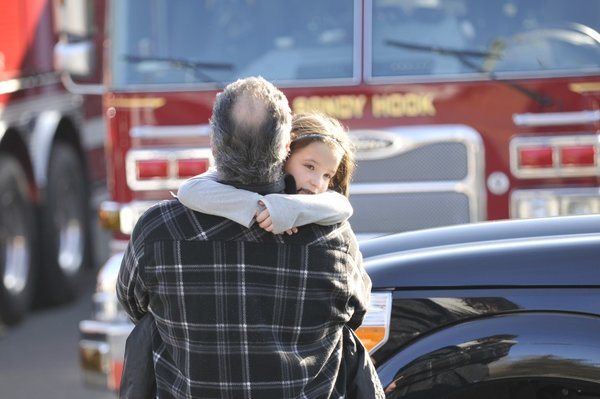The Golden Rule:
“Do unto other people’s kids as you would have them do unto your kids.” (From participants of “Children, Families, and Social Issues Seminar”-The Poynter Institute 1998)

Yesterday was a tough day for the nation, but it was excruciating for the families of Sandy Hook Elementary School. 28 people are dead today that were alive on Thursday, including 20 young children. That kind of loss is unimaginable, unnecessary, and unforgiveable. But the number of victims is much higher than 28. As President Obama pointed out, “Our hearts are broken for the parents of the survivors as well, for as blessed as they are to have their children home tonight, they know that their children’s innocence has been torn away from them too early, and there are no words that will ease their pain.”
As the police were gathering the terrified kids and rushing them out of the building, the officers told the kids to close their eyes so they wouldn’t see the blood and the bodies. It was a small thing, but if it prevented the kids from seeing something they wouldn’t ever be able to forget, it was worth it. And that makes it one hundred times more despicable that when the children emerged from the building, traumatized and confused, they were met by reporters and cameras snapping pictures and shoving microphones in their faces.
I eventually turned the TV off because I couldn’t bear to watch these kids and their parents being questioned. One reporter said to a child, “You weren’t scared, were you?” Of course the kid was scared and how dare you in any way imply that he shouldn’t have been.
Is there evidence that being questioned by reporters increases the trauma for young kids? How about the personal experience of blogger Kim Simon, who was 14 when her friend was murdered at school. She says she remembers very little about what happened except, “YOU were there. YOU, with your enormous video cameras. YOU, with your microphones poking into the bubble of grief that grew bigger as we waited for our parents to find us. YOU, with your horrible questions about what had happened, had we known Mike, had we seen anything? No parents there yet, just children. No teachers, just children. And you.”
There is no journalistic value in the information an 8-year-old gives you when he or she has just gone through a horrifying experience, but there is a great deal of harm that you can do to both the child and the parents. What they say in the moment while still confused and hurt may be regretted at a later time. The Central Union for Child Welfare has this advice for reporters: “Children are also more vulnerable to publicity than adults, as children are not necessarily capable of evaluating their own privacy or knowing what should be kept secret about their own lives or the lives of those close to them. Nor are they necessarily capable of evaluating the effect of what they say on their own lives and those around them.”
I assume that all of the reporters got permission from the parents to conduct these interviews but I don’t think that makes a bit of difference. In a situation like that, where the parents are likely in a state of shock as well, the only person who is thinking clearly and making reasonable decisions is probably the reporter. So it is the journalist’s responsibility to choose not to interview those suffering families.
These kids just got a horrifying lesson in how little the world can protect them if someone is determined to do them harm; the last thing they need is to then be exploited by professional journlists who are hoping to get every last ghastly detail. Asking a grade school kid to relive the moment when bullets were flying by his head does not add to my understanding of the situation at all. It’s not useful information for me, it’s voyeurism of the worst and most exploitative kind.
As James Poniewozik wrote at Time.com: “Reporting tragedy is terrible business, awful and necessary. Unspeakable things have happened, and it’s a journalist’s job to find out about them and tell the world… But there are much better ways to do this.”
So yes, please, turn away the cameras. Better yet, turn them off until you’ve moved away from the children. We are professionals. We should do our job professionally and thoroughly, but we must also do it ethically. There should be a higher standard than “juiciest soundbyte, damn the cost.” And that standard should always protect the most vulnerable among us.